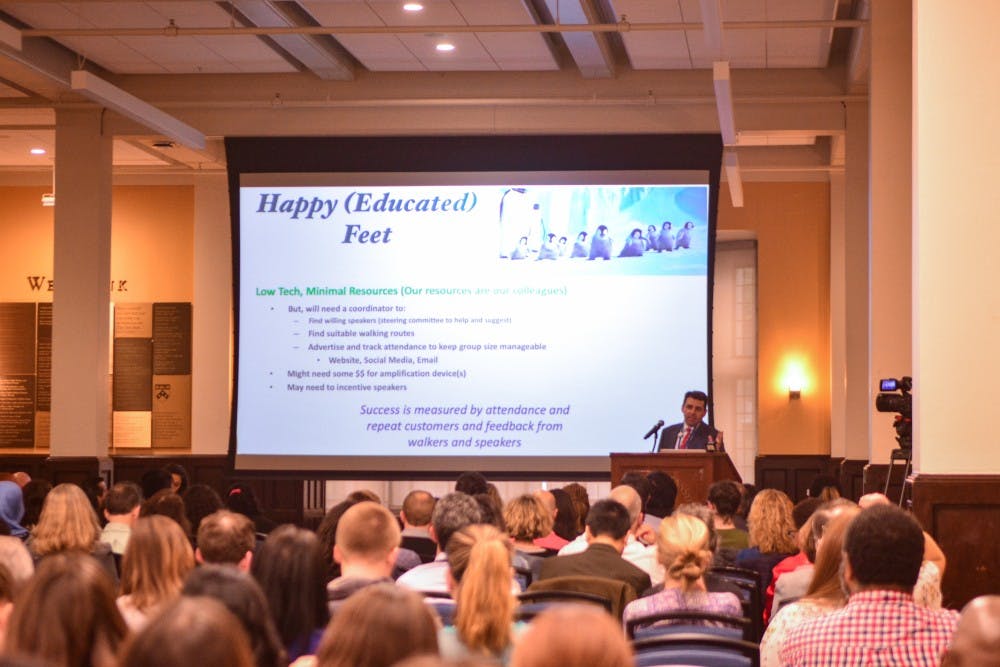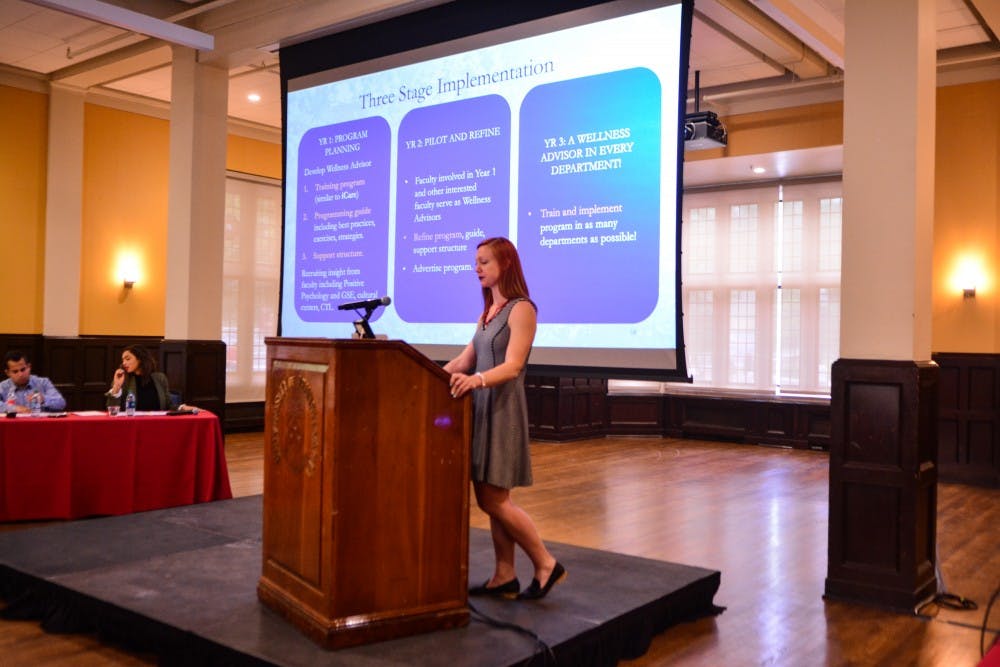
One pitch in the "Your Big Idea" challenge promoted themed-walks and landed in the semifinals.
Credit: Future KortorPenn will implement three new initiatives next fall to improve wellness on campus. The decision was made at the final round of the "Your Big Idea" wellness competition, where judges chose themed walks, nature prescriptions, and urban farms as the winners.
Penn launched the “Your Big Idea” challenge on Feb. 4, calling on all Penn-affiliated people to submit ideas to enhance wellness at Penn. After submissions closed on March 1, a committee of students, faculty, and staff voted on the ideas in mid-March and selected semifinalists. At the "Enhancing Wellness at Penn: Big Idea Pitch Event" on April 25, a team of administrator and student judges chose the three winners of the challenge.
The initiative is being led by Faculty Senate Chair and Penn Nursing professor Jennifer Pinto-Martin and Chief Wellness Officer Benoit Dubé.
At the pitch event, 14 semifinalists gave pitches under a three-minute time limit to the panel of judges and an audience. Audience members could rate the ideas with an online link in real-time on a scale of five, with one being “not interested,” and five being “definitely fund this.” The judges took the audience votes into consideration when making their final decision, which is based on five criteria including the number of Penn affiliates the initiatives will impact.
Elaine Weigelt, a Community Outreach Program manager for the Center for Public Health Initiatives and Amanpreet Kaur, Community Health and Engineering librarian, pitched “weekly themed walks” open to all Penn staff, faculty, and students that would be lead by experts at Penn talking about different topics.
“We have an epidemic on campus of sitting,” Weigelt said in the pitch. “Imagine a walk with a librarian, a walk with a botanist, a walk with a provost,” Kaur added.

Chloe Cerwinka, a Landscape Planner for Facilities and Real Estate Services, pitched “Nature Rx,” a program that would encourage health providers on and near campus to prescribe time in nature to students seeking help.
The idea is based on a similar program implemented at Cornell University by newly appointed CAPS executive director Gregory Eells. At Cornell, the program included a committee led by faculty, staff, and students who manage the website that lists natural places on and near campus and a student organization that leads weekly walks. Eells co-wrote a recently published book entitled “Nature Rx: Improving College-Student Mental Health.”
A similar program, called NaturePHL, was also piloted at the Children’s Hospital of Philadelphia in August 2017. The database has a map of parks across Philadelphia.
“Imagine how many people we could reach,” Cerwinka said in her pitch, adding that students do not need to leave campus to spend time in nature as Penn is considered one of the only urban campus arboretums in the United States.
Lila Bhide, who is the coordinator for the Penn Community Garden, said during her pitch that poor nutrition and financial barriers to eating regular meals add to the stress of college students. She said she hopes to address these issues along with climate change and mental health with “Penn Food Hub.”
Penn Food Hub would act as an urban farm operated partially by Penn students, faculty and staff volunteers. The farm could be modeled off of similar projects implemented on urban campuses such as Yale’s, she added. Yale's farm, which broke ground in 2003, is an "academic farm" that produces many types of vegetables, fruits, herbs, and flowers, according to its website. Yale has classes in which students visit the farm to study the connection between land and food. The farm also hosts weekly volunteer workdays for students.

While one acre may seem small, Bhide said up to 22,000 pounds of produce can be grown on that land in a year.
“Penn would truly be the best of both worlds,” Bhide said. “We would get all the opportunities from an urban campus, without sacrificing any of the benefits of nature and the therapeutic aspects of growing food.”
“We heard 14 very convincing and compelling ideas,” Dubé said before announcing the ideas. “Just because we will not be naming all 14 for potential funding doesn’t mean all these ideas will sit on the shelf and gather dust.” He added that there will be “additional avenues for dialogue and collaboration.”
The panel of judges at the event consisted of administrators and students. Sitting on the panel were Dubé, Pinto-Martin, Executive Director of Penn Medicine Center for Health Care Innovation David Asch, Vice President of the Division of Human Resources Jack Heuer, Undergraduate Assembly President Michael Krone, and Graduate and Professional Student Assembly President Haley Pilgrim.
Semi-finalist proposals that did not win in the final round include ideas for an animal cafe and for an embedded model of Counseling and Psychological Services, where a CAPS psychologist would be stationed at each of Penn's schools.
The Daily Pennsylvanian is an independent, student-run newspaper. Please consider making a donation to support the coverage that shapes the University. Your generosity ensures a future of strong journalism at Penn.
Donate







